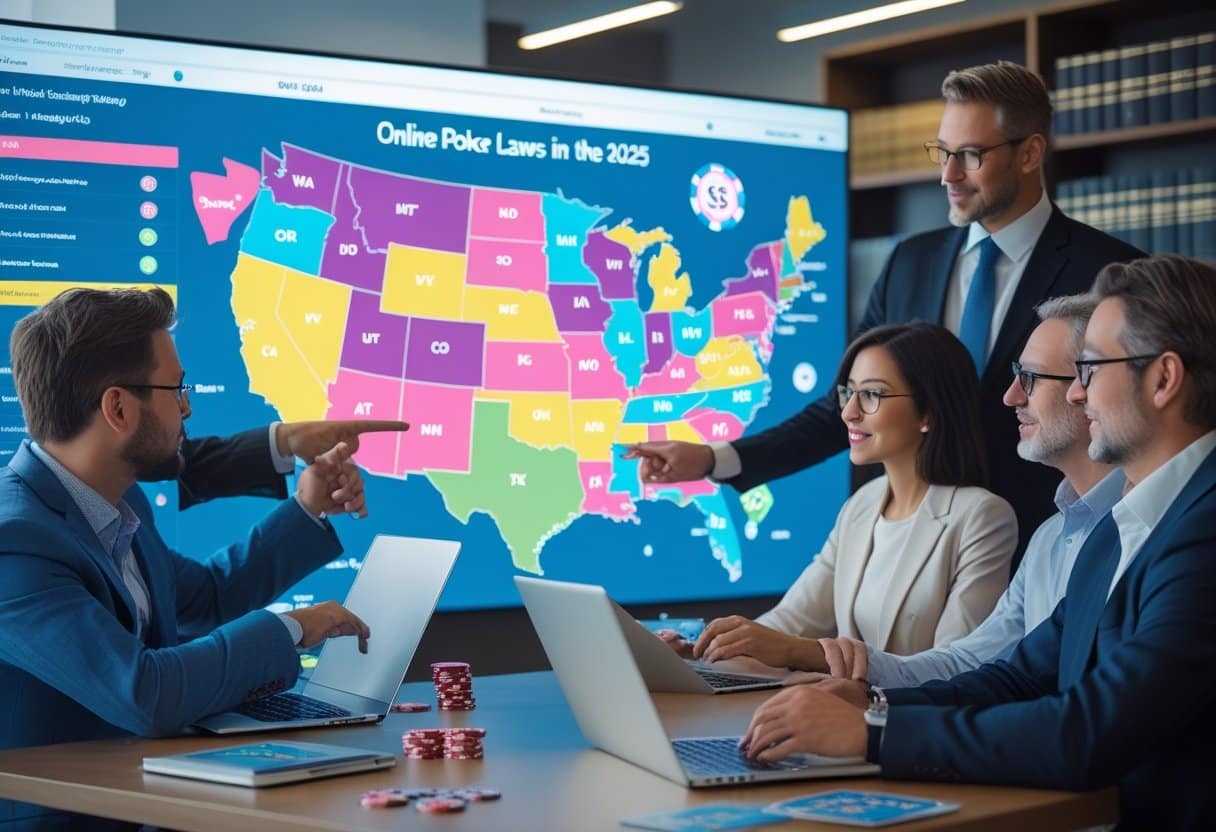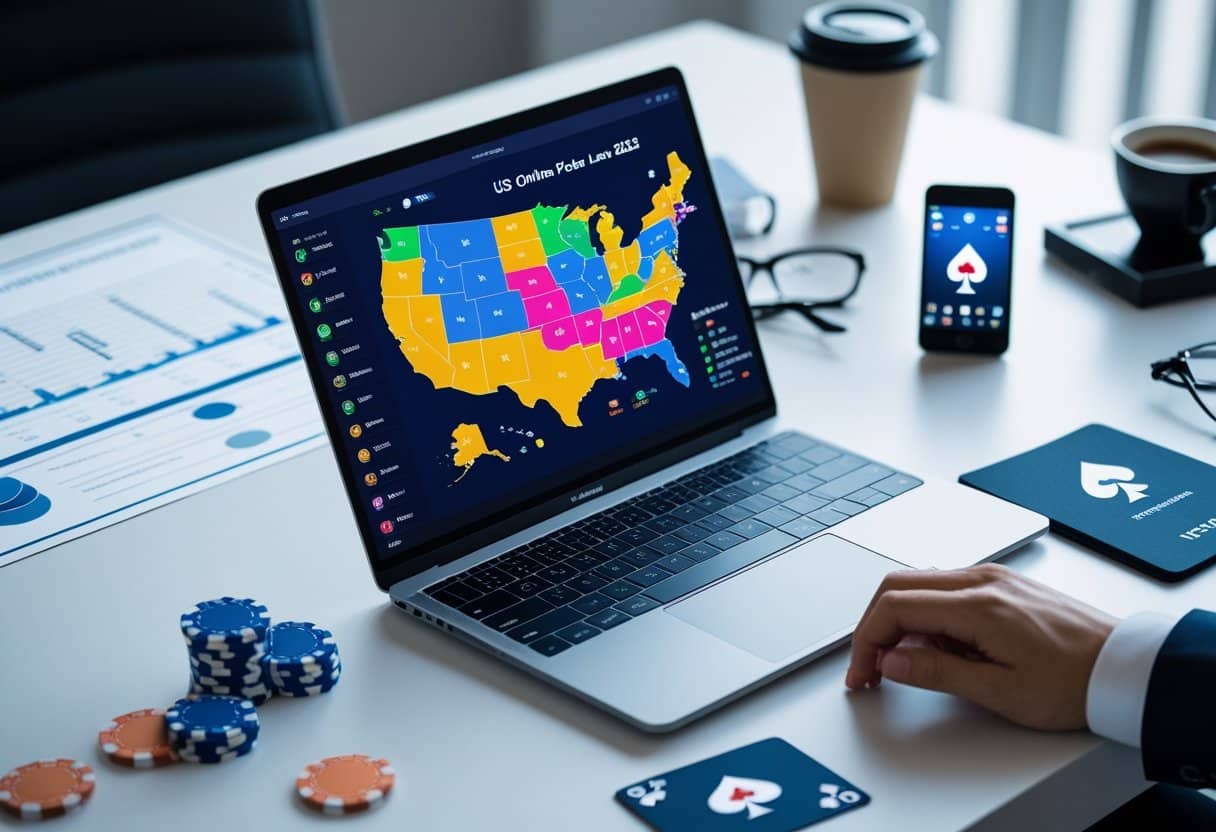Online poker laws in the US are, frankly, all over the place. Depending on where you live, the rules can get confusing fast.
As of early 2025, only about six to eight states have given online poker the official green light with state-issued licenses. These include Nevada, Delaware, New Jersey, Pennsylvania, West Virginia, Michigan, and a few others that have just recently jumped on board.

Regulation keeps shifting, too. Pennsylvania is expected to join the multi-state poker compact by April 2025, which means players there could soon face off with folks from other states.
That’s a big deal for the online poker community. Bigger player pools usually mean more games and juicier tournament prizes.
Understanding US Online Poker Laws in 2025

Online poker laws in the US are built on a complicated mix of federal rules and state-by-state decisions. More states seem to be warming up to the idea of legal online poker, but progress is slow and uneven.
The landscape keeps changing as lawmakers debate new bills and regulators figure out what works.
Key Federal Regulations
The backbone of US online poker law comes from a few major federal acts. The Unlawful Internet Gambling Enforcement Act (UIGEA) of 2006, for example, doesn’t actually make online poker illegal—it just blocks gambling businesses from accepting payments for illegal bets.
The Wire Act of 1961 muddied the waters for a while. But in 2011, the Department of Justice finally clarified that the Wire Act only applies to sports betting, not poker.
That ruling cracked the door open for states to regulate online poker on their own terms.
The Interstate Treaty on Gambling lets states with legal online poker join forces and share player pools. That’s huge for liquidity and game selection if you’re in a participating state.
Terminology: Online Poker, iGaming, and Gambling Laws
Online poker is just what it sounds like—poker for real money, played over the internet. It’s different from other gambling options because there’s a skill element involved.
iGaming is the catch-all term for any kind of gambling online, whether it’s poker, slots, table games, or sports betting. States often treat these categories differently in their laws.
Regulated poker sites need a license from state gaming authorities. That means your funds are protected and games are supposed to be fair.
Offshore sites, on the other hand, operate outside US law and don’t offer the same protections.
The way a state defines poker matters. Some call it a “game of skill” instead of gambling, which can change how it’s taxed and regulated.
Recent Legal Developments
By 2025, eight states have legalized online poker: Connecticut, Delaware, Michigan, Nevada, New Jersey, Pennsylvania, Rhode Island, and West Virginia. Each has its own regulatory setup for licensed sites.
Interstate compacts have grown a lot. The Multi-State Internet Gaming Agreement (MSIGA) now connects several states, so player pools are bigger and markets are more sustainable.
Tribal gaming groups are getting more involved, too. In some states, tribes are running their own online poker platforms under tribal-state agreements.
A few states—Illinois, New York, and California—have bills on the table that could legalize online poker soon. If they do, the US legal poker map could look very different.
Legal Online Poker: State-By-State Overview
The online poker scene in the US really depends on your zip code. As of June 2025, only a handful of states have gone all-in on legal online poker, while others are either working on it or have banned it outright.
Fully Legal Online Poker States
Here are the six states where online poker is fully legal and up and running:
Nevada: The pioneer—legal since 2013. The WSOP online platform is based here. You’ve got to be physically in Nevada to play.
New Jersey: Also legalized in 2013. The market is busy, with sites like PokerStars, WSOP, and PartyPoker. They’ve set up interstate compacts for bigger player pools.
Pennsylvania: Rolled out legal online poker in 2019. PokerStars PA and WSOP PA are the main options. Pennsylvania joined the multi-state compact in 2024.
Michigan: Legal since 2021. Michigan joined the interstate compact in 2023, so you can play against people in other states.
Delaware: Small population but an early adopter—online poker’s been legal since 2013. 888poker powers the state’s platform.
West Virginia: Legal since 2019, though it’s taken a little longer for platforms to actually launch.
States with Pending or Proposed Legislation
These states are inching closer to legal online poker, but it’s not quite there yet:
Connecticut: Passed a law, but no platforms have launched. Compact talks are still going.
Illinois: Has seen a bunch of bills from 2023 to 2025. The latest made it through committee but hasn’t cleared the full legislature.
New York: After a few failed tries, a new bill in early 2025 is finally gaining traction. It would allow for interstate player pools.
California: The biggest potential market, but tribal and commercial interests keep clashing. Nothing’s passed yet.
Massachusetts: Introduced a big internet gambling bill in late 2024, including online poker.
States Where Online Poker Is Prohibited
Some states have slammed the door on online poker, either through explicit bans or strict laws:
Utah: Gambling is banned by the state constitution, and that’s not changing anytime soon.
Washington: Has some of the harshest anti-online gambling laws. Playing online poker is a Class C felony here.
South Dakota: State law clearly forbids internet gambling. Recent efforts to change that have gone nowhere.
Louisiana: Unless you’re in a parish that voted to allow it, online poker is illegal for most of the state.
Kentucky: The state has gone after online poker sites aggressively, even seizing domain names. Legalization attempts keep failing.
Alabama: Courts and lawmakers agree—poker is illegal gambling, online or off.
Where to Play: Legal Poker Sites and Operators
If you’re lucky enough to live in a state with legal online poker, picking a trustworthy site is a must. You want fair games, safe payments, and a legit license that actually protects your money.
Reputable Licensed Operators
The eight states with regulated online poker—Connecticut, Delaware, Rhode Island, Nevada, New Jersey, Pennsylvania, West Virginia, and Michigan—are mostly dominated by a few big brands. These platforms have to follow strict rules set by state gaming boards.
Top Licensed Poker Sites by State:
| Platform | Available States | Notable Features |
|---|---|---|
| PokerStars | MI, NJ, PA | Largest player pools, diverse tournaments |
| WSOP.com | NV, NJ, PA, MI | Official World Series of Poker qualifiers |
| BetMGM Poker | MI, NJ, PA | Integrated with casino rewards |
| Partypoker US | NJ | Strong tournament schedule |
Every site will ask you to verify your identity. They also offer tools for responsible gaming and keep player funds in separate accounts, so your money isn’t at risk if the company has financial trouble.
Major Online Casino Operators
Some of the biggest names in casino gaming have moved into online poker as states have opened up. These companies bring serious resources and a reputation for reliability.
Leading Casino Operators in Poker:
- Caesars Entertainment (WSOP.com)
- MGM Resorts (BetMGM Poker)
- Flutter Entertainment (PokerStars)
- Bally’s Corporation (Various regional brands)
A lot of these operators let you use one account for poker, casino games, and sports betting. Shared wallets and loyalty programs are pretty standard.
Their physical casinos add another layer of trust. Plus, many run live tournament series that tie into their online offerings.
Choosing Safe Gaming Sites
Before you sign up anywhere, double-check that the site is licensed in your state. Legal sites show their licensing info front and center and use encrypted connections.
Key Safety Factors:
- Licensing information clearly displayed on the site
- Geolocation technology to make sure you’re playing legally
- Secure payment methods and withdrawals that don’t take forever
- Clear terms and conditions for bonuses and promotions
Steer clear of offshore sites like Bovada. They might take US players, but you won’t have any legal protection if something goes wrong.
It’s worth browsing independent review sites or poker forums to see what real players are saying. Look for sites with fast, helpful customer support and a solid track record for resolving disputes.
Tribal Gaming, Compacts, and Online Poker
Tribal nations are a big part of the US gambling world, and their ability to offer online poker depends on some pretty complex agreements with state governments.
Role of Tribal Casinos in Online Poker
Tribal casinos are everywhere in the US, often running huge gaming operations on sovereign tribal land. While they’ve mostly focused on in-person gaming, more tribes are now eyeing the online space.
Connecticut’s a good example—tribal operators there have entered the online poker market thanks to special provisions in their gaming deals. The Mohegan Tribe and Mashantucket Pequot Tribal Nation both run online gambling platforms, including poker.
Some tribes have teamed up with established online poker brands to get their digital offerings off the ground. These partnerships let tribes keep their sovereignty while tapping into outside expertise.
Gaming Compacts and State Agreements
Gaming compacts are the legal agreements between tribes and states that spell out how gambling works on tribal land. These documents decide if online poker is allowed and what the rules are.
A law passed in May 2021 let one state’s governor renegotiate tribal compacts to include digital gaming. That’s become a bit of a blueprint for other states.
States like Michigan and Pennsylvania have set up systems that let tribal casinos join the online poker market alongside commercial operators. Tribes usually need to get a state license and pay similar fees and taxes.
Since 2023, more tribes have been renegotiating their compacts to secure online poker rights.
Other Legal Considerations for US Online Poker
There’s more to online poker than just whether it’s legal in your state. Players have to keep an eye on bonuses, platform integration, and other gambling options that might be available.
Casino Bonuses, Free Spins, and Player Incentives
Most legal US poker sites roll out a bunch of bonuses to attract new players and keep regulars coming back. Welcome bonuses often match your first deposit, giving you extra chips to play with, but you’ll need to meet certain wagering requirements before you can cash out.
No-deposit bonuses are nice for trying out games risk-free. Loyalty programs let you rack up points for every dollar you play, which can be traded for cash, tournament tickets, or sometimes merchandise.
Free spins are usually tied to casino games, not poker. Bonuses come with expiration dates and restrictions, so always read the fine print—terms and conditions can be wildly different from site to site.
Casino and Sportsbook Integration
Most legal poker platforms in the US are part of bigger gambling ecosystems now. That means you can use the same account and wallet for poker, casino games, and sports betting.
Sites like BetMGM and PokerStars let you jump from poker to slots or the sportsbook without moving your funds around. It’s pretty convenient if you like to mix things up.
Shared bonuses and loyalty programs are common, too. Points you earn at the poker table might count toward casino rewards, and vice versa.
States with multi-gambling licenses usually allow this cross-platform play. Pennsylvania, New Jersey, Michigan, and West Virginia are probably the best examples of fully integrated gambling experiences right now.
Legal Online Betting Alternatives
If online poker isn’t legal where you live, don’t worry—there are still some regulated options out there. Legal sports betting, for example, has taken off recently and is now available in over 30 states, including places like New York, Ohio, and Massachusetts.
Daily Fantasy Sports (DFS) sites such as FanDuel and DraftKings are another route. They operate legally in most states, letting you draft players and compete for real cash prizes.
For horse racing enthusiasts, it’s pretty straightforward to bet online through licensed platforms like TVG or TwinSpires. These sites usually offer live streams and betting on races happening all over the country.
And if you’re into online casinos, a handful of states—Pennsylvania, New Jersey, Michigan, West Virginia, Delaware, and Connecticut—have legalized slots and table games. Some states also have legal online lotteries, with instant-win games that honestly feel a lot like mini casino sessions.













